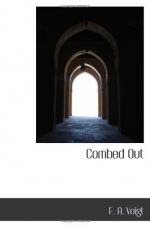One night, after we had been at the C.C.S. for about a month, we heard the uproar of a distant air-raid. Early the next morning a number of motor-ambulances arrived with their loads of wounded men. A camp, a mile or two from the station, had been bombed and fifty men had been killed and many more wounded. One of the “cases” brought into the theatre had been hit on the forehead. The bomb-fragment had not penetrated the skull, but had passed along its surface. The scalp hung over the forehead loosely like an enormous flap, the red, jagged edge nearly touching the eyebrows. Since then I thought of this man every time there was an air-raid.
The event increased our uneasiness. After each “bombing-stunt” we thought: “We were lucky this time—it will be our turn next though.” Moreover, we began to realize our helplessness. We were compelled to remain in our tents during a raid and there was no possibility of taking shelter. We could have put on our steel helmets—they would at least have afforded some head protection, but hardly any of us had the courage to do anything that might be regarded by the others as a sign of fear.
The discussion about the bombing of hospitals had made us all think of air-raids. We had nearly finished our day’s work when we noticed a few clouds on the horizon. We felt relieved. Perhaps the sky would be overcast and we would have an undisturbed night.
“I can’t stick night raids,” said one of our number. “They don’t put my wind up a bit, but they interfere with my sleep and make me feel tired in the mornings.”
A man who had been in the war from the beginning answered:
“I can see you haven’t been out here long, and have never been in a proper raid. I’ll never forget the last time we were bombed. We were out on rest about fifteen miles behind the line. Fritz came over and I had the wind up so badly that I left the tent to go into the open fields. (I’d had a taste of it before, you know, and that makes all the difference.) Then he bombed us before I knew where I was. I ran for my life. There was a hell of a crash behind me and a bit caught me in the shoulder and knocked me down. When it was all over I got up and went back, although my shoulder hurt like anything. A lot of our fellows were running about and shouting. Where my tent used to be, there was a big bomb-hole and my mates were lying dead all round—fourteen of them. I didn’t recognize most of them, they were so smashed up. Fritz had dropped one right on the tent. I reckon I was lucky to get off with a Blighty! I was in hospital six weeks and then I got ten days’ sick leave in London. Fritz came over one night—Christ, I didn’t half have the wind up! We were sitting in the kitchen, mother and father didn’t seem to mind much—they didn’t know what it meant. Fritz had never dropped any our way before. I never heard such a barrage, at least not for aeroplanes. It wasn’t so bad as out here all the same—you could take shelter, anyhow. Air-raids are bloody awful things, they put my wind up much more than shell-fire.”




